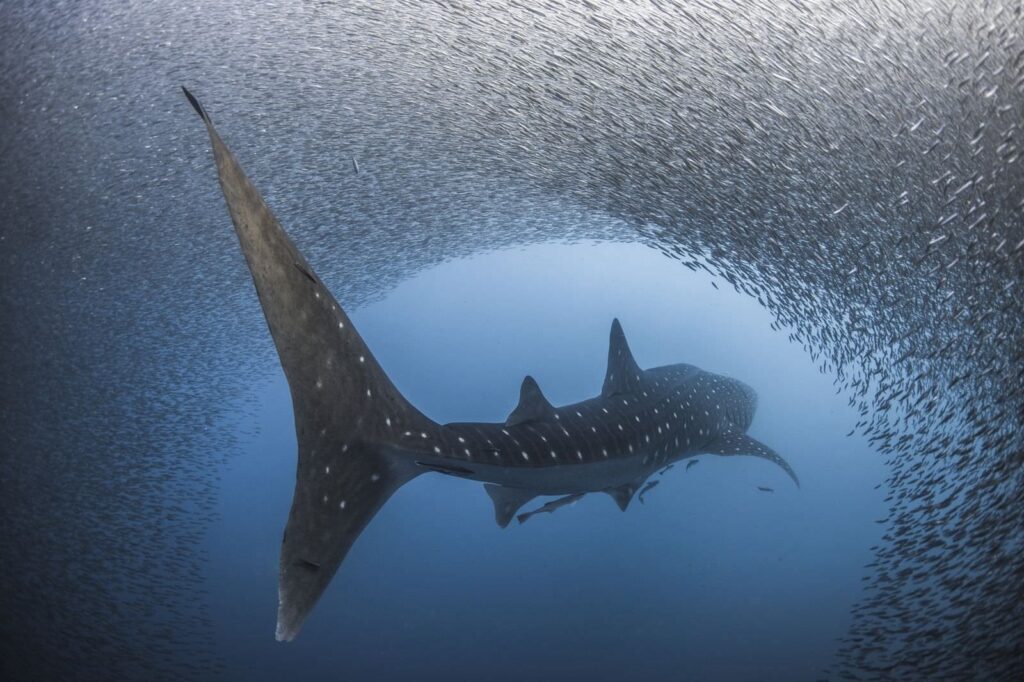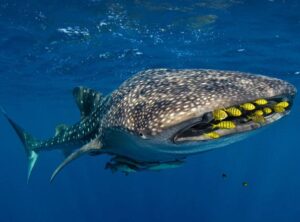
Whale sharks look quite different to how we imagine a shark to look. They are enormous, reaching 12 meters or more in length and weighing as much as 16 tons – basically, they are about the size of a bus! And they don’t have sharp teeth, in fact their teeth don’t really assist in feeding at all. So, it’s no surprise that people often ask us the question…is a whale shark a shark?
Are Whale Sharks Really Sharks?
The answer is yes, whale sharks really are sharks. They have all the 33 characteristics of a shark, such as a cartilage skeleton, five pairs of gills and unfused pectoral fins to the head. Unlike whales, they are not mammals and their young are not fed by the mother’s milk. Like sharks, whale sharks are fish. In fact they are the largest fish in the ocean. So, whale sharks really are sharks…and they get their name from the fact that they are enormous!
What Do Whale Sharks Eat?
Whale sharks have rows of over 300 tiny teeth, but as filter feeders they do not use these teeth to eat. Instead, whale sharks (and other filter feeding sharks) swim along the ocean’s currents with their huge mouths open wide, filtering large quantities of water as they go and extracting tiny organisms called plankton & krill from the water. A whale shark’s mouth is about 1.5 meters wide, so it’s an impressive sight!
The 3 largest sharks include (in size order)
- Whale Shark 17 meters
- Basking Shark 15 m
- Megamouth Shark 7-8 m
All filter feeders!
Diet: Plankton (tiny organisms), krill and small fish
Ten Amazing Whale Shark Facts
- Largest fish and shark in the world
- Habitat: warm open waters of the tropical oceans
- Whale sharks spend most of their time near the surface
- Lifespan: 70 to 100 years
- Average length of an adult: 9.7 meters
- Average weight: 9 tonnes
- Teeth: over 300 rows of tiny teeth – not used for eating!
- Whale sharks are solitary creatures
- Filter feeders – feeding mainly on plankton
- Able to process over 6,000 litres of water each hour
Why We Need Sharks
Learn more about sharks?
Check out our Amazing Sharks Online Shark Course
Check out our Shark Resources
Further reading…
Save Our Seas – Whale Sharks Down Under





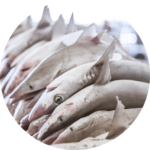 Many people fear sharks because of sensationalised stories in the media and scary films like Jaws.
Many people fear sharks because of sensationalised stories in the media and scary films like Jaws.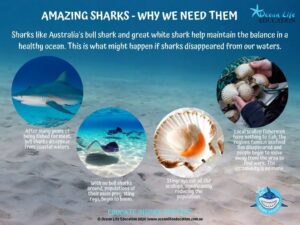
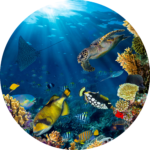 Sharks are APEX predators, which means they sit at the top of the food chain and help control the numbers of animals below them in that food chain. By controlling populations of large and mid-sized predators, sharks allow smaller fish to thrive, which has a knock on effect on the food chain below them. Therefore, sharks help create a healthy ecosystem with a diverse range of species and competitors.
Sharks are APEX predators, which means they sit at the top of the food chain and help control the numbers of animals below them in that food chain. By controlling populations of large and mid-sized predators, sharks allow smaller fish to thrive, which has a knock on effect on the food chain below them. Therefore, sharks help create a healthy ecosystem with a diverse range of species and competitors.
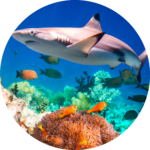 Sharks help prevent habitat loss. Habitats like coral reef depend on their fishy caretakers, like the little reef fish that live on them and clean and protect them from disease. Without sharks controlling numbers of big fish in a marine ecosystem, the numbers of these fish could explode. They would in turn kill off the smaller fish. If that happens, the reef would become diseased and die off, affecting millions of animals that depend on it for survival.
Sharks help prevent habitat loss. Habitats like coral reef depend on their fishy caretakers, like the little reef fish that live on them and clean and protect them from disease. Without sharks controlling numbers of big fish in a marine ecosystem, the numbers of these fish could explode. They would in turn kill off the smaller fish. If that happens, the reef would become diseased and die off, affecting millions of animals that depend on it for survival. The earth’s ocean produces 70 % of the oxygen we breath, food to eat, controls the climate, breaks down pollution, provides us with medicine and much, much more.
The earth’s ocean produces 70 % of the oxygen we breath, food to eat, controls the climate, breaks down pollution, provides us with medicine and much, much more.
